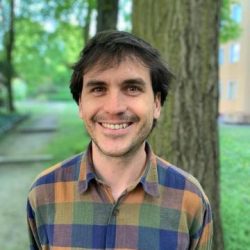Alberto Fierro, Postdoctoral Fellow, Central European University (Austria)
Project Title: Expanding the Boundaries Between Academia and Activism: A Participatory Workshop
Alberto’s project focuses on alternative paths to knowledge production. Moved by a body of work that criticizes traditional research approaches (see decolonial scholars like Linda Tuhiwai Smith, the ‘coloniality’ tradition, and the Black feminist critique), the projects asks how to explore and push the existing boundaries between scholarship and activism. Alberto will develop collaborative research with Diana Marcela Gomez Correal (Universidad de los Andes), the Movimento dos Trabalhadores sem Teto (Homeless Workers’ Movement), a Brazilian social movement that has been struggling for the right to housing for more than 20 years, and two other movements from Colombia. The central tension of this project is how to enhance the dialogue and collaboration between researchers and activists to develop useful knowledge against intersecting inequalities. The researchers will organize an international workshop that will gather a limited number of scholars and activists from Brazil and Colombia. The two main research questions that guide this project are: 1. How can activists (and scholars) enhance their knowledge about intersecting inequalities? What tools do people who lack institutional education have to research access to democratic institutions? 2. How do researchers unlearn traditional approaches and develop more participatory research practices? What kind of knowledge can support the struggle against social hierarchies?
The central objective of the workshop is to explore and transcend the rigidity that exists between ‘researchers’ and ‘researched’. This idea comes from a progressive scholarly tradition called Participatory Action Research, originally developed in Latin America by – among others – the Colombian sociologist Orlando Fals Borda. The participants of the workshop will be mainly working-class women of African ancestry. They are the leaders of the MTST and the Colombian movements.
This proposal envisions two important forms of community impacts: direct and indirect. The first one can be identified as the strong effects the workshop will have on participants. The most important is the daily allowance. This will not only represent a source of income, but it will also sustain activists’ self-confidence. Other direct impacts for the participants are the strengthening of writing skills and the empowerment through the development of knowledge on intersecting inequalities. At the end of the three days of work, the collective will also carefully evaluate the activities, possibly with methods (like questionnaires) that allow for synthetic measurement.
